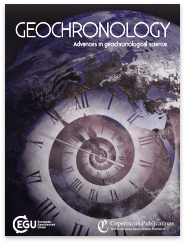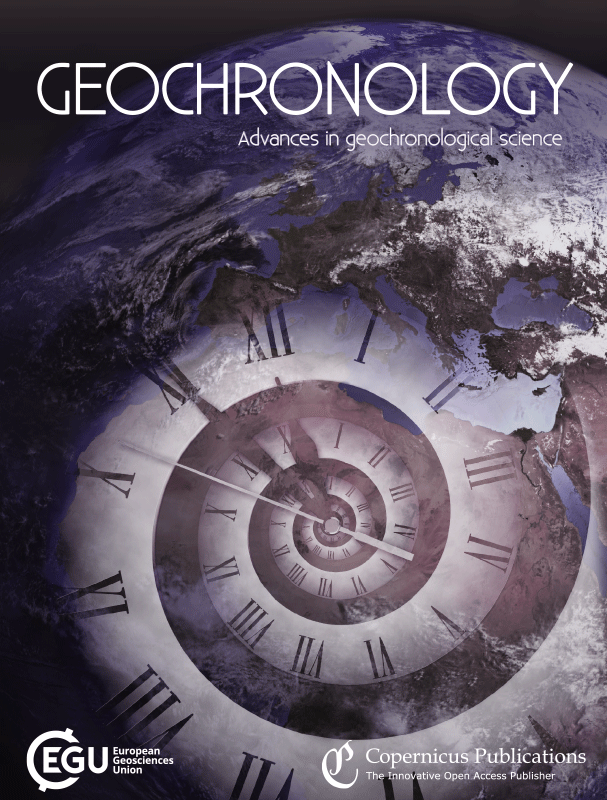Editors: Philippa Ascough, Tibor J. Dunai, Georgina King, Andreas Lang & Klaus Mezger
eISSN: GChron 2628-3719, GChronD 2628-3735
Geochronology (GChron) is a not-for-profit international scientific journal dedicated to the discussion and publication of high-quality research on the physical, chemical, and biological processes used to quantify time in all environmental and geological settings throughout Earth's history.
Journal metrics
GChron is indexed in the Web of Science, Scopus, Google Scholar, etc. We refrain from displaying the journal metrics prominently on the landing page since citation metrics used in isolation do not describe importance, impact, or quality of a journal. However, these metrics can be found on the journal metrics page.
04 Dec 2025
Technical note: Investigation into the relationship between zircon structural damage and Pb mobility using chemical abrasion, SIMS, Raman spectroscopy, and atom probe tomography
Charles W. Magee Jr., Lutz Nasdala, Renelle Dubosq, Baptiste Gault, and Simon Bodorkos
Geochronology, 7, 591–602, https://doi.org/10.5194/gchron-7-591-2025,https://doi.org/10.5194/gchron-7-591-2025, 2025
Short summary
25 Nov 2025
Atmospheric 10Be from Talos Dome (East Antarctic) ice core records geomagnetic dipole intensity from 170 to 270 ka BP
Alexis Lamothe, Edouard Bard, Nicolas Thouveny, Ellyn Auriol, Mirko Severi, Rita Traversi, Martine de Angelis, Frank Wilhelms, Robert Mulvaney, Fawzi Zaidi, Georges Aumaitre, Karim Keddadouche, and Mélanie Baroni
EGUsphere, https://doi.org/10.5194/egusphere-2025-5707,https://doi.org/10.5194/egusphere-2025-5707, 2025
Preprint under review for GChron (discussion: open, 2 comments)
Short summary
24 Nov 2025
Short communication: Estimating radiocarbon reservoir effects in Bolivian Amazon freshwater lakes
Asier García-Escárzaga, Umberto Lombardo, Patricia M. Bello-Alonso, José M. Capriles, André Colonese, Kate Dudgeon, Carlos D. Simões, and Ricardo Fernandes
Geochronology, 7, 583–589, https://doi.org/10.5194/gchron-7-583-2025,https://doi.org/10.5194/gchron-7-583-2025, 2025
Short summary
18 Nov 2025
OSLThermo and ESRThermo: Libraries of codes for trapped-charge thermochronometry
Chloé Bouscary, Georgina E. King, Melanie Kranz-Bartz, Maxime Bernard, Rabiul H. Biswas, Lily Bossin, Arnaud Duverger, Benny Guralnik, Frédéric Herman, Ugo Nanni, Nadja Stalder, Pierre G. Valla, Vjeran Visnjevic, and Xiaoxia Wen
EGUsphere, https://doi.org/10.5194/egusphere-2025-5474,https://doi.org/10.5194/egusphere-2025-5474, 2025
Preprint under review for GChron (discussion: open, 1 comment)
Short summary
Highlight articles
24 Oct 2025
Accuracy and validity of maximum depositional ages in light of tandem (laser ablation and isotope dilution) U–Pb detrital zircon geochronology, including results from northern Alaska
Trystan M. Herriott, James L. Crowley, Marwan A. Wartes, David L. LePain, and Mark D. Schmitz
Geochronology, 7, 513–543, https://doi.org/10.5194/gchron-7-513-2025,https://doi.org/10.5194/gchron-7-513-2025, 2025
Short summary
All EGU highlight articles 
News
03 Dec 2025
New MS Word template available for manuscript preparation
The existing MS Word template for authors has been significantly expanded and now includes many important notes on the standard sections that must be included in the manuscript. Please visit the "Submission" page, section "Templates for your manuscript file" and download the new template before writing your next manuscript. 
03 Dec 2025
New MS Word template available for manuscript preparation
The existing MS Word template for authors has been significantly expanded and now includes many important notes on the standard sections that must be included in the manuscript. Please visit the "Submission" page, section "Templates for your manuscript file" and download the new template before writing your next manuscript. 
06 Mar 2025
Get involved, become a referee, and help shape GChron's community publication output
We are pleased to announce that a new referee application form is now available. This means that if you are interested in contributing to the peer-review process and supporting high-quality scientific publishing in your community then you can apply today to become a referee. Your expertise can make a difference. Visit the online form here to learn more and join our reviewer community. 
06 Mar 2025
Get involved, become a referee, and help shape GChron's community publication output
We are pleased to announce that a new referee application form is now available. This means that if you are interested in contributing to the peer-review process and supporting high-quality scientific publishing in your community then you can apply today to become a referee. Your expertise can make a difference. Visit the online form here to learn more and join our reviewer community. 
Notice on the current situation in Ukraine
To show our support for Ukraine, all fees for papers from authors (first or corresponding authors) affiliated to Ukrainian institutions are automatically waived, regardless if these papers are co-authored by scientists affiliated to Russian and/or Belarusian institutions. The only exception will be if the corresponding author or first contact (contractual partner of Copernicus) are from a Russian and/or Belarusian institution, in that case the APCs are not waived.
In accordance with current European restrictions, Copernicus Publications does not step into business relations with and issue APC-invoices (articles processing charges) to Russian and Belarusian institutions. The peer-review process and scientific exchange of our journals including preprint posting is not affected. However, these restrictions require that the first contact (contractual partner of Copernicus) has an affiliation and invoice address outside Russia or Belarus.



